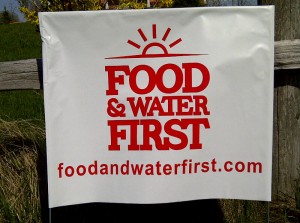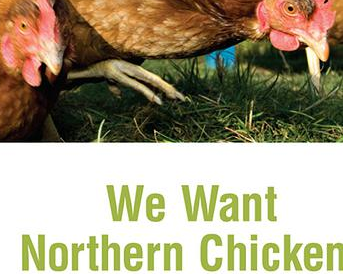Related Campaigns
#3things4food

This campaign is a part of Community Foundations of Canada’s ‘Vital Signs’ program. The CFC released the ‘Fertile Grounds: sowing the seeds in Canada’s food system’ highlighting the multiple food security facing citizens today.
Using social networks, #3things4food encourages people to examine their food system and share ideas for action. This includes getting to know what matters in their community, getting to know their farmers and food, increasing healthy food choices and thinking sustainably.
Please see the leaflet and the the video for more ideas and information.
Campaign added: October 30th, 2013
Put Food and Water First
 Food & Water First is a movement dedicated to protecting Ontario’s Class 1 farmland and source water regions. We are rural and urban citizens who understand that our province’s rare agricultural soils and water resources provide us with a great bounty that must be preserved. We encourage the Ontario government to adopt a Food & Water First policy so our vital agricultural sector and source water regions are given priority in land-use planning.
Food & Water First is a movement dedicated to protecting Ontario’s Class 1 farmland and source water regions. We are rural and urban citizens who understand that our province’s rare agricultural soils and water resources provide us with a great bounty that must be preserved. We encourage the Ontario government to adopt a Food & Water First policy so our vital agricultural sector and source water regions are given priority in land-use planning.
Growing out of the successful “Stop the Mega Quarry!” campaign, Food and Water First hopes you will sign their pledge and support their ongoing efforts to permanently preserve agricultural land and freshwater resources in Ontario. Read an account of how the movement has shifted from fighting a single battle to engaging in a full campaign across the province.
Sign the pledge to put food and water first or pick up a sign to declare your support publicly.
Campaign added July 25, 2013
Save the Bees
 The Ontario Beekeeper’s Association has been working hard to have the neonicotinoid pesticides responsible for bee losses removed from use in Ontario. As part of their strategy, the OBA has drafted a petition requesting the Premier of Ontario to follow the lead of the European Union and ban neonicotinoid pesticides.
The Ontario Beekeeper’s Association has been working hard to have the neonicotinoid pesticides responsible for bee losses removed from use in Ontario. As part of their strategy, the OBA has drafted a petition requesting the Premier of Ontario to follow the lead of the European Union and ban neonicotinoid pesticides.
To learn more about this campaign and the plight of the bees, check out the OBA’s comprehensive resource page and watch the video below for an in-depth look at colony collapse disorder:
Bee Aware from Greg Stanley on Vimeo.
Sign the petition and share this link (http://chn.ge/11J53Jc) with your followers and friends!
Campaign added July 25, 2013
We Want Northern Chicken
In Ontario’s northern communities, chicken farmers are producing under 0.5% of their communities’ needs each year. That’s only enough local chicken for one day each year. Eat Local Sudbury’s “We Want Northern Chicken” campaign asks the provincial government to review its supply management framework to make it easier for small farmers to gain access to quota and provide for their own communities.
At present, there is only one quota holder in Northern Ontario. In 2011, this producer and the small farmers only produced .34% of the chicken demand in the North. This is a terrifying fact about our food security. Additionally, due to the distance between towns and the lack of processing facilities, if another farmer in the north were to get access to quota at the current entry level, there aren’t facilities that could process the chickens, causing increased potential cost to the farmer to ship south for processing.
To support this campaign, email them to order postcards for your community, follow them on Facebook and Twitter to spread the word, and sign a petition on the associated Flocking Options campaign website.
Campaign added August 2, 2013
Raise the Minimum Wage in Ontario
Prices are going up while wages stay the same. Between 2010 when minimum wage was frozen and 2013, the cost of essentials has gone up while the purchasing value of minimum wage has declined 6.5%.
Low wage workers are getting less of the pie. If minimum wages had grown since 1976 as fast as labour productivity has grown, then the average minimum wages today would be $16 per hour. That means that workers are getting paid less for the value of our labour. Despite the increases in minimum wage from 2004 to 2010, Ontario’s current minimum wage represents 15% of hourly output of the average Canadian worker – down from 25% in the late 1970s.
Without a realistic liveable wage, Ontarians earning the current minimum wage for their work will be at an increased risk of food insecurity. Without stable access to nutritious food which is more expensive in many cases than frozen or fast food, workers and their families are at a higher risk of a range of health conditions. This has ramifications for the wider health care system as well.
If you agree that the province needs a higher minimum wage, visit the campaign’s website, send a letter to Premier Wynne, or get involved directly.
Campaign added August 19, 2013


